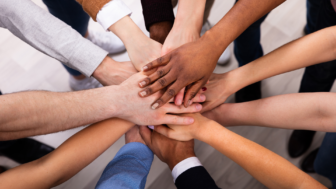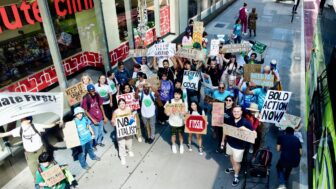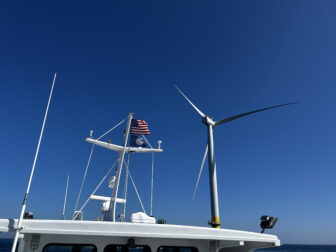 Camila is the DC campaign director for the Chesapeake Climate Action Network, and has been at the heart of the movement behind what will soon become the strongest climate bill in the country. She coordinated and led the “DC Climate Coalition,” which is made of more than 110 environmental and justice advocacy organizations, faith groups, unions, consumer advocacy organizations, D.C. businesses, and more. Here’s her story.
Camila is the DC campaign director for the Chesapeake Climate Action Network, and has been at the heart of the movement behind what will soon become the strongest climate bill in the country. She coordinated and led the “DC Climate Coalition,” which is made of more than 110 environmental and justice advocacy organizations, faith groups, unions, consumer advocacy organizations, D.C. businesses, and more. Here’s her story.
What woke you up to the climate crisis?
I was 15 when I first saw the climate “hockey stick” graph. I realized that this skyrocketing arrow of temperature would take place in my life time. All of the big milestones of life that I was looking forward to would be in the context of this big global crisis. It led to the question of whether or not to have kids — which is still a big question for me — where I would put down roots, what my family would do. My mom’s a farmer; will that be still viable in Oregon, where I’m from, when temperatures get so extreme?
Then I had the great fortune of visiting my extended family — including a bunch of cousins in Australia — after I graduated from high school. For my eighteenth birthday, they gave me this awesome gift of a day snorkeling on the Great Barrier Reef. But I saw that the reef, even then, was starting to bleach out. That was one of the first realizations that all these forecasts of devastation were already starting, and at a very fast rate.
What impacts of climate change currently hit home to you?
The last two summers, my home in the Rogue Valley in southern Oregon has been suffocated by wildfire smoke. My mom started the first commercial organic cut-flower farm on the West Coast. I grew up there with my little sister. But now, my sister works with her, and they have to wear heavy-duty gas masks, with the level of smoke that sometimes makes southern Oregon look like Beijing. It was like that for eight weeks this summer.
Then the Paradise fires happened, following all the previous years’ fires in California. There was an illusion that if you live in a town or city that you’re going to be safe, but that’s been totally obliterated. Homes and entire cities have been burned to the ground. People escaped down these two-lane roads on foot, or in cars with their kids while the outsides are melting and the glass was too hot to touch. Entire families have burned to death.
Even though I live out in DC and thankfully no fire has come that close to my hometown, they come closer every year, they last longer every year, the number of fires grows every year, and it’s not getting better. I don’t know what that means for how to feel safe. I would love to move back there someday but, frankly, don’t feel great about what the future holds. For the whole West Coast. Wherever there are trees, it’s like a forest of matchsticks that could provide fuel to the fire.
 What brought you to CCAN and the campaign in DC?
What brought you to CCAN and the campaign in DC?
I was so excited to talk with Mike Tidwell when the vision for passing a carbon fee and rebate in DC was starting to come into focus. It followed my work in Oregon starting what became a national organization called Our Climate which trains young people and students to advocate for strong and effective climate policy, to meet with lawmakers and host creative events to raise awareness and make the issue really fun to participate in.
By the time Mike reached out, we had a partnership with Years Of Living Dangerously that had just taken off with the national Put A Price On It campaign and I felt like the initial chapter getting that off the ground was pretty well complete for me — we had just onboarded this amazing new executive director, Page Atcheson Matilsky, and I realized that my heart is really in campaigning on the ground, being in state capitols, working directly with coalitions and lawmakers to get legislation passed. So I was really excited to take what I had learned about carbon pricing and campaigns and get it done in DC where there is such a smaller body of lawmakers and such a more progressive body of lawmakers than in many places.
 How did that morph into what the campaign is today?
How did that morph into what the campaign is today?
We came really close to the introduction of a carbon tax in DC! It was hard because our hopes had been raised very high. The Council Chairman said that a majority of the Council was in favor of our proposal and Councilmember Cheh stated publicly that it was a great policy.
While the carbon tax was never introduced, we created what one of our allies called a “political crisis” that was too good to go to waste. This incredible coalition built intense political pressure. Constituent demand had formed for strong and fair climate policy in DC, creating the opening for Councilmember Mary Cheh and Nicole Rentz — her brilliant staff leader — to put together a package of policies that had already been called for under the Clean Energy DC plan and introduce it thanks to all of the pressure that we generated. We’re grateful for what she has championed since the bill’s introduction in July.
This is a bill that, if it passes in its original form, would cut emissions almost 50 percent in DC and set a lot of precedence in the country. Frankly, we don’t have time to pick our favorite policy. I think we should absolutely all fight for what we think is best and then, only after expending 110% of ourselves and coming up against a real wall should we consider compromise of any sort. And the compromise we ended up with is a real strong one I think we can all be proud of.
How is this campaign different from other environmental campaigns you’ve worked on in the past?
It’s the most harmonious and hardworking coalition that I’ve ever helped build and lead. I credit Justin Wright of Habitus Incorporated with laying the foundation for that ability to collaborate. We brought him in the beginning of the campaign for a carbon tax after the Washington State I-732 debate was brewing. It became really clear you needed to have a really active and thorough stakeholder engagement process to make sure that the policy you put forward is really collaboratively shaped by as many groups in the community as possible. That’s way easier said than done. For a policy as complex and ambitious, and the number of organizations that have an interest in it, turns out having a professional like Justin was essential. That set up great relationships that have made working on this campaign such a joy.
What was your favorite moment in this campaign?
We did so many creative actions around the Wilson Building! If I could pick two actually, the last two were my favorites. The beach volleyball event in front of the Council was really fun to be out there in shorts and lifeguard sweatshirts on a November day, punting a big inflatable earth volleyball around, and then being able to testify before the Council in that sweatshirt and say, “the reason we were all out there is that we’re tired of politicians playing games with our only planet.” I think that CCAN consistently brings that creativity and that fun, which grounds all of this wonky policy-speak back in why we’re doing this and how we’re doing it — makes it possible to make us seem even bigger than we are.
 I also loved unfurling the enormous banner of thousands of petitions that had been collected by our coalition and all of our incredible volunteers over the last two and a half years. We went inside the Council building with these boxes, and thanks to Jamie DeMarco at Citizens Climate Lobby and Rebekah Whilden of Sierra Club who have done this before, we strung the petitions together and — even though it wasn’t technically allowed by security — we unfurled it throughout the halls of the first floor of the Wilson building, creating an enormous loop. It just felt like all of the voices of DC residents who so passionately want DC to do the right thing were all represented there. It was a really fun moment to look back and think about all the nights our team has been at ANC meetings, getting resolutions passed, canvassing at farmers’ markets and metro stops, and speaking to classes — this many people were working so hard to build a win, it was cogent proof that people’s voices make a difference.
I also loved unfurling the enormous banner of thousands of petitions that had been collected by our coalition and all of our incredible volunteers over the last two and a half years. We went inside the Council building with these boxes, and thanks to Jamie DeMarco at Citizens Climate Lobby and Rebekah Whilden of Sierra Club who have done this before, we strung the petitions together and — even though it wasn’t technically allowed by security — we unfurled it throughout the halls of the first floor of the Wilson building, creating an enormous loop. It just felt like all of the voices of DC residents who so passionately want DC to do the right thing were all represented there. It was a really fun moment to look back and think about all the nights our team has been at ANC meetings, getting resolutions passed, canvassing at farmers’ markets and metro stops, and speaking to classes — this many people were working so hard to build a win, it was cogent proof that people’s voices make a difference.
I don’t think I’ve ever experienced the power of democracy and grassroots power-building exerted onto lawmakers for such a tangible outcome. The link between the action and end results has been very tight on this campaign in a way that I haven’t experienced before.
What was your biggest accomplishment on this campaign?
Persistence. We just never stopped, and that’s what CCAN does also; it’s part of our DNA. And it really matters. I think people give up too soon. Our team and the incredible coalition we’ve been a part of, we didn’t slow our roll. That’s what you have to do if you’re going to force politicians into a corner where they just have to do something.
One word summing up your experience with this campaign:
Empowering!
What do you hope to see happen in the next year after the Clean Energy DC Act passes?
DC should pass a carbon tax ;)
What’s next in the life of Camila?
My fiance and I are going on a month-long meditation retreat where I always find the best tools for building personal resilience and the ability to keep working on climate change and living a joyful, balanced life. I’m really excited about that — I’ve done five- and ten-day retreats before, and they’ve always been more rewarding than they are challenging. And they are challenging.
Who would you high five?
Nicole Rentz — this wouldn’t have happened without her.







